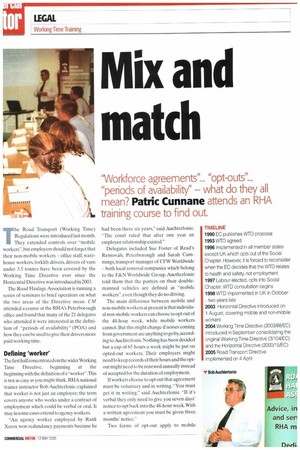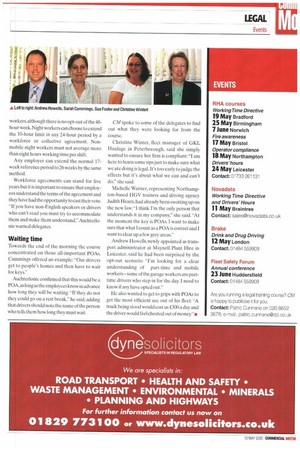Mix and match
Page 34

Page 35

If you've noticed an error in this article please click here to report it so we can fix it.
"Workforce agreements"... "opt-outs"... "periods of availability" — what do they all
mean? Patric Cunnane attends an RHA
training course to find out.
The Road Transport (Working Time) Regulations were introduced last month. They extended controls over "mobile workers", but employers should not forget that their non-mobile workers office staff, warehouse workers, forklift drivers, drivers of vans under 3.5 tonnes have been covered by the Working Time Directive ever since the Horizontal Directive was introduced in 2003.
The Road Haulage Association is running a series of seminars to brief operators on what the two areas of the Directive mean. CM attended a course at the RHA's Peterborough office and found that many of the 21 delegates who attended it were interested in the definition of -periods of availability" (POA) and how they can be used to give their drivers more paid working time.
Defining 'worker'
The first half concentrated on the widerWorking Tune Directive, beginning at the beginning with the definition of a "worker".This is not as easy as you might think. RHA national trainer instructor Bob Auchterlonie explained that worker is not just an employee; the term covers anyone who works under a contract of employment which could he verbal or oral. It may in some cases extend to agency workers.
"An agency worker employed by Rank Xerox won redundancy payments because he had been there six years," said Auchterlonie. "The court ruled that after one year an employee relationship existed."
Delegates included Sue Foster of Read's Removals. Peterborough and Sarah Cummings, transport manager of CFW Worldwide both local removal companies which belong to the F&N Worldwide Group. Auctherlonie told them that the porters on their doublemanned vehicles are defined as "mobile workers", even though they do no driving.
The main difference between mobile and non-mobile workers at present is that individual non-mobile workers can choose to opt out of the 48-hour week, while mobile workers cannot. But this might change if noises coming from government are anything to go by, according to Auchterlonie. Nothing has been decided but a cap of 65 hours a week might be put on opted-out workers. Their employers might need to keep records of their hours and the optout might need to be renewed annually instead of accepted for the duration of employment.
If workers choose to opt out that agreement must be voluntary and in writing. "You must get it in writing," said Auchterlonie. -If it's verbal they only need to give you seven days' notice to opt back into the 48-hour week. With a written agreement you must be given three months' notice.
Two forms of opt-out apply to mobile workers, although there is no opt-out of the 48hour week, Night workers can choose to extend the 10-hour limit in any 24-hour period by a workforce or collective agreement. Nonmobile night workers must not average more than eight hours working time per shift.
Any employer can extend the normal 17week reference period to 26 weeks by the same method.
Workforce agreements can stand for five years but it is important to ensure that employees understand the terms of the agreement and they have had the opportunity to cast their vote. "If you have non-English speakers or drivers who can't read you must try to accommodate them and make them understand," Auchterlonie warned delegates.
Waiting time
Towards the end of the morning the course concentrated on those all-important POAs. Cummings offered an example: "Our drivers get to people's homes and then have to wait for keys."
Auchterlonie confirmed that this would be a POA ,as long as the employees kn ow in advance how long they will he waiting. "If they do not they could go on a rest break," he said, adding that drivers should note the name of the person who tells them how long they must wait. CM spoke to some of the delegates to find out what they were looking for from the course.
Christine Winter, fleet manager of GKL Haulage in Peterborough, said she simply wanted to ensure her firm is compliant: "I am here to learn some tips just to make sure what we are doing is legal. It's too early to judge the effects but it's about what we can and can't do," she said.
Michelle Warner, representing Northampton-based HGV trainers and driving agency Judith Hearn, had already been swotting up on the new law: "I think I'm the only person that understands it in my company," she said. "At the moment the key is POAs. I want to make sure that what I count as a POA is correct and I want to clear up a few grey areas."
Andrew Howells, newly appointed as transport administrator at Maynell Plant Hire in Leicester, said he had been surprised by the opt-out scenario: "I'm looking for a clear understanding of part-time and mobile workers — some of the garage workers are parttime drivers who step in for the day. I need to know if any have opted out."
He also wanted to get to grips with POAs to get the most efficient use out of his fleet: "A truck being stood would cost us £300 a day and the driver would feel cheated out of money." •
























































































































































































































